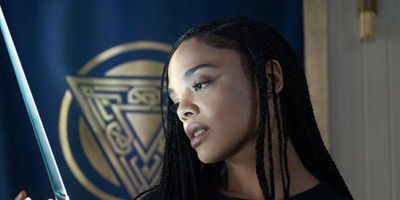Culture & Entertainment

Ad
This review contains spoilers for the plot of Thor: Love & Thunder
It took me three tries to watch Thor: Love and Thunder in the waking nightmare that is the Covid/Monkeypox pandemic era. The two screenings I attempted to attend, full of people wearing Thor’s viking helmet but no masks over their noses and mouths, may very well be my villain origin story.
On opening day, I climbed the stairs to the top of Hollywood’s regal and expansive El Capitan theater in the middle of the afternoon and sat in the middle of the very last row in what felt like acres away from the sparse (but still unmasked?!!) crowd of moviegoers, and watched til the end of the credits, disappointed by the journey.
That is to say, I can relate to the movie’s villain, Gorr.
The film begins with Gorr (Christian Bale) and his young daughter, the last survivors of their people, trekking through the desert, desperate, wounded, starving. Gorr’s daughter dies on the journey and a distraught Gorr unwittingly stumbles into the valley of his people’s god. A devout worshiper despite the total annihilation of his people and his daughter, Gorr bows before his god and begs for answers for his people’s destruction. The god, gorging himself on fruit in the lap of luxury, is dismissive, even laughing at Gorr and his people’s fate. “The gods will use you but they will not help you,” Gorr learns firsthand. The Necrosword, the only weapon strong enough to kill gods, chooses Gorr for its mission, and in grasping the Necrosword and murdering his god, Gorr the God Butcher is born.
So, yeah, in a pandemic, where 6.4 million people have been disappeared by a deadly virus, due in large part to the incompetence, greed, and apathy of the people in power, I’d say Gorr the God Butcher is a villain for our times. And Bale plays the role with heartbreaking sincerity. But a successfully told story needs more than timely themes and great acting.
Co-written and directed by Taika Waititi, Thor: Love and Thunder is like watching a bunch of unrelated plot lines swirling around in a blender without enough water to make it stick. There are at least three beginnings to the film before the plot gets moving. And after slogging through recycled gags and tedious exposition via voice over narration from the Kronian warrior Korg, played by Waititi, it becomes obvious that this is a director who loves the sound of his own voice. But what he’s trying to say with all. those. words. is much less clear.
In Gorr’s first battle against Thor (Chris Hemsworth), The Mighty Thor (Natalie Portman’s Jane) and Valkyrie (Tessa Thompson), Gorr starts losing badly and decides instead to kidnap the children of New Asgard to lure Thor and his ax, Stormbreaker, into a trap. Gorr keeps the children in cages and then Thor makes a “kids in a cage” joke. Is this supposed to be some commentary on the inhumane caging of children happening at the US border? If so, what’s the joke?
In a particularly disturbing scene during the movie’s climax, Thor ventures alone into the shadow realm and imbues the kidnapped children with the powers of Thor (on a temporary basis) so they can fight off the shadow monsters while he fights Gorr. The children’s eyes glow and electricity shoots from their fingers as they kill the monsters. In a truly unhinged moment, a child screams in delight as she swings around her teddy bear (also possessed with the powers of Thor) to kill a bunch of shadow monsters. I suppose that was meant to be funny too.
Just before Thor gave those children superpowers to kill, it looked like he was praying over them, like many in America pray over their kids before sending them out into a world where they can be gunned down in school, at a parade, or by police. But instead of a forcefield or some kind of hedge of protection, Thor empowers them to kill and we in the audience are supposed to cheer at their violence.
In one of the film’s many beginnings detailing the life of Thor, we see Thor as an infant, strapped to his mother’s chest as she swan dives into the heat of battle, an exhilarated Baby Thor screaming along in delight. The film ends with the kidnapped children reunited with their families in New Asgard and happily training for their next battle. But Waititi doesn’t seem to grasp that this is a really bad thing! On the contrary, the future of New Asgard, Thor says, is now secured.
I guess, instead of ending the harm against children, the solution is to teach them to kill. For an America that sells bulletproof backpacks, refuses to ban assault weapons, and lets the military recruit for its ranks on school grounds, this is the superhero movie we deserve.
It’s not all terrible. There are a few laugh out loud moments and as many nods and winks at the existence of queerness that Disney would allow. And Portman’s Jane/The Mighty Thor and her terminal cancer journey are the compelling heart of the film, though her waning mortality seems to only be a device to speed up Thor's growth into an adult who knows how to love. But, I’mma be honest: I came to see King Valkyrie licking a sword and I blinked at the wrong time during a crucial fight scene and I missed it. In fact, King Valkyrie is MIA far too often for my taste. When she’s not on the screen, I just want to know where she is. When she is on screen, I want to know why she’s not doing, saying, being more. Show us Valkyrie's lesbian love story or at least show her meeting Africans in the Diaspora and learning what box braids are, you cowards!
As soon as Thor arrives in New Asgard, King Valkyrie all but relinquishes control to him, deferring to his incessant need for spot-light stealing and speech-making in the wake of New Asgard’s children being stolen. For the climax battle, King Valkyrie is out of commission, bested by Gorr the God Butcher with Zeus’ lightning bolt. Instead, Jane gets the triumphant moment to save Thor, on King Valkyrie's faithful Pegasus steed, no less. After her star turn in the much better, actually revolutionary Thor: Ragnarok, (there was a revolution of the enslaved! The imperialist empire of old Asgard was destroyed!) it’s even more obvious how wasted Thompson’s talents were here to make room for Jane and Thor’s love story.
And cool, the main message is that Thor chose his love for Jane over vengeance and fighting. But the moment Jane succumbs to cancer, turns to gold dust, and floats away to Vallahar to rest with Asgard’s other dead gods, Thor just gets right back to fighting and war.
The final (pre-credits) scene is of Thor and his newly adopted goddess-preteen Love (Gorr’s resurrected daughter) diving into battle, side by side, mirroring his own introduction into battle as an infant with his mom. But in a world where even god-children can’t just be kids and grow up in peace, what is there to love?
Let’s make things inbox official! Sign up for the xoNecole newsletter for daily love, wellness, career, and exclusive content delivered straight to your inbox.
Featured Image by Marvel / DisneyALSO ON XONECOLE


